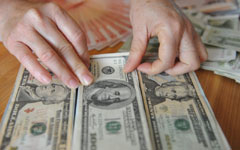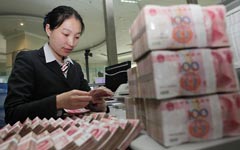In 2009, when renminbi internationalization started, most commentators paid little attention to it, believing it would take several decades for the Chinese currency to become a major financial force. But since then, China has pushed ahead, step by step, to promote the use of its currency outside of the country. In 2009, only 1.1 percent of bank deposits in Hong Kong were held in renminbi. By February this year, the total had risen to 12.4 percent of Hong Kong's total bank deposits. In 2010, less than 1 percent of global trade was settled in renminbi. Today, the proportion is approaching 20 percent.
In 2007, the first renminbi-denominated bond (or dim sum bond) was issued outside China. By March this year, the total issuance in offshore dim sum bonds was $60 billion, with much more on the way. Offshore trading in Hong Kong of the renminbi has developed quickly, from the unofficial market created by Chinese exporters a decade ago (the non-deliverable forward market) to today's large offshore renminbi market centering on renminbi held outside mainland China.
Recently, promotion of the renminbi's international role has extended into Europe, with the signing of agreements with the German and British governments to make Frankfurt and London into centers for renminbi settlement, joining Hong Kong, Singapore and Taipei. The renminbi now ranks ahead of the euro, and behind only the US dollar, as No 2 in trade finance; and ahead of the Swiss franc as No 9 in global payments.
But the renminbi's rise has owed much to China's dominant role as the major trading partners of other Asian countries. More than 80 percent of the international payments which use the renminbi presently involve the Chinese mainland or Hong Kong. The renminbi won't become a global currency until it is widely used outside Asia by non-residents for conducting transactions, for borrowing, and for making investments that don't involve China. Investors around the world will not regard the renminbi as a currency they can rely on until it is freely traded, and can flow freely in and out of China, or is fully convertible.













